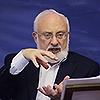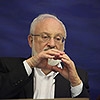The parallels between the rise of Nazism in the 1930s and today’s political climate are clear. Political extremism on both the left and the right have started to take hold. Civilized discourse between the various groups has devolved into name-calling, and the ghosts of anti-Semitism have reawakened, which many hoped were dead and buried along with the Third Reich. These echoes from the past should sound an alarm for Jews around the world, and especially in America. If history was to repeat itself and the unthinkable were to occur, how close are we to another Holocaust?
Then and Now
Steven Spielberg, who established the USC Shoah Foundation to preserve the memory of the Holocaust, expressed deep concern that genocide is as possible today as during the Nazi era. “When collective hate organizes and gets industrialized, then genocide follows,” Spielberg commented in a recent media interview. “We have to take it more seriously today than I think we have had to take it in a generation,” he added.
Within three months of Hitler’s coming to power in Germany in 1933, a nationwide boycott of Jewish businesses and professionals was ordered. The Nazis’ official explanation for the boycotts was that they were implemented as a counter-reaction to the demands of Jewish organizations in the US and Britain to boycott German-made products due to the Nazis coming to power (which was true). This action legitimized anti-Jewish activity and gave it official support, which had not existed until then and marked the commencement of the war against the Jews, as anti-Semitic ideology began penetrating into German consciousness.
The Nazis’ boycotts included harassment and vandalism of Jewish businesses, people and institutions. They were followed by a downward spiral of actions that lead to the deaths of six million of our brethren. It is understandable that when we hear the word “boycott,” it still triggers a brutal reminder of the beginnings of the Holocaust.
Israel’s Enemies from Within and Without
One of the major differences between the 1930s and today is that the State of Israel exists. Israel today is like the Jews of Germany in the 1930s: it stands at the frontline and beats the brunt of a new war on the Jews. Instead of blatant anti-Semitism, the hatred of Jews has been repackaged under the guise of anti-Zionism that today’s anti-Semites say is either Jewish apartheid or the Israeli government’s policies. This is meant to confuse the public and isolate Israel. However, we should not be deceived: anti-Zionism is anti-Semitism. Sadly, some extreme leftist Jewish organizations such as J Street and IfNotNow, as well as Israeli activists and intellectuals, are playing a leading role in global hatred campaigns, such as the BDS movement, which are meant to demonize and isolate Israel.
The Israeli students recently attacked in Warsaw for admitting they were from Israel, and the traditionally dressed Jews brutally assaulted in Brooklyn, were easy to identify as Jewish by their clothing and language. Secular Jews should take no comfort in this, nor should they fool themselves into believing that this cannot happen to them in the United States.
European Jews also dissociated themselves from the warning signals in the 1930s. The 1935 Nuremberg Laws stated that one Jewish grandparent made you Jewish and bought you a one-way ticket to the gas chambers.
What should we recognize about the current war against the Jews? It is potentially scarier than the Nazi’s war on the Jews. The new anti-Semitism can affect any Jew, anywhere, anytime, since threats are coming at us from all sides, in every shape and form: from radical Islam, the far-right and far-left, mainstream politics, economic forces, and even from the worlds of arts and academia.
The BDS movement’s growing influence portends the danger that may lie ahead. Zooming in, we reveal that the boycotts are working effectively: Europe’s largest bank, HSBC, divested from the Israeli defense company Elbit Systems, and the German sports company, Adidas, ended its 10-year sponsorship of the Israel Football Association (IFA). The BDS movement takes credit for both actions. Soda Stream and Ahava relocated their factories from the West Bank to undisputed areas in Israel. We cannot be naïve and think these are campaigns only against Israeli settlements: It is a war on the very legitimacy of the Jewish state, which is constantly singled out by international organizations and falsely accused of the worst possible atrocities.
All the charges against the Jews by the Nazis are echoed by the BDS movement against Israel and Jews. The Nazis claimed that Jews were the root of all evil, brought World War I to Europe, destroyed the German economy, and undermined the country. Similarly, BDS proponents claim that Israel is waging war, exploiting innocent Palestinians, extorting the world, and committing genocide.
The anti-Semitic trend in the United States is also unfavorable. 19% of Americans think that small shops have the right to refuse service to Jews if doing business with them goes against the religious beliefs of shop owners, according to a recent survey published by the Public Religion Research Institute.
It’s the Same War in Israel or America: It’s Our Shared Destiny
In addition to the economic impact, the most resounding influence of BDS activity is in the Western academic world, affecting Jewish students and academics. Senior researchers refuse to maintain links with universities in Israel and with Israeli researchers, while student associations pressure for the marginalization of Israel. The New York University Department of Social and Cultural Analysis voted to boycott the university’s Tel Aviv campus, and the American Association of University Professors issued a statement supporting the decision. The boycott movement covers virtually all campuses of US academic institutions including Harvard, Princeton, Columbia and Yale. It also reaches inside student dormitories, creating a hostile and violent atmosphere for Jewish students who publicly support Israel, and even for those who are simply known as being Jewish.
Although many Jews in the Diaspora claim to have issues with the State of Israel, or at least its official policies, many of the boycott movements’ proponents make no such distinctions. For them, a Jew is a Jew, a good Jew is a dead Jew, and a good Israel is the one that is wiped off the map and erased from reality.
Israel is an intrinsic part of the collective Jewish identity and is perceived that way by the nations of the world. So when judgement is passed and punishment imposed on Israel, it falls on the entire Jewish collective and not on only an individual part.
The increasing pressure against Jews and the State of Israel is an attention call for us to come together and ask essential questions: Who are we? Where do we come from? Where are we headed?
The Jewish people are a unique example. The fact that we originally came from different backgrounds, united above our differences and become one people, “as one man with one heart,” makes us unique. But being special does not mean we are to look down on others from above; it means we are to serve others. Delivering that example of unity under the premise “love your neighbor as yourself” is what the nations of the world subliminally demand from us. They instinctively feel Jews hold the keys for peace and prosperity in the world, and their complaint for not sharing it is manifested as anti-Semitism.
It is incumbent upon us Jews to unite above our differences yet again. The only thing that will end the new war against the Jews is our making all the Jewish people as one. If we can find this desire to unify within us and fan its flames, we will become a positive force that will permeate the world, and hatred against us will vanish.
As Kabbalist Yehuda Ashlag wrote during WWII in his 1940 paper, The Nation:
It is also clear that the enormous effort that the rugged road ahead requires of us mandates unity that is as solid and as hard as steel from all parts of the nation, without exception. If we do not come out with united ranks toward the mighty forces that are standing on our way to harm us, we will find that our hope is doomed in advance.
And from that common ground and goal, Jews must embark on a shared path that is not motivated by fears and materialistic impulses, but instead by the desire for a common spirit and vision as one unified and thriving people for this and future generations.
 In the News (archipreneur): “By 2050, 90% of the world’s largest cities will be exposed to rising seas. The vast majority of coastal cities will be impacted by coastal erosion and flooding, displacing millions of people, while destroying homes and infrastructure. Marc Collins Chen, Co-Founder and CEO of OCEANIX, said humans can live on floating cities in harmony with life below water. …
In the News (archipreneur): “By 2050, 90% of the world’s largest cities will be exposed to rising seas. The vast majority of coastal cities will be impacted by coastal erosion and flooding, displacing millions of people, while destroying homes and infrastructure. Marc Collins Chen, Co-Founder and CEO of OCEANIX, said humans can live on floating cities in harmony with life below water. …


















